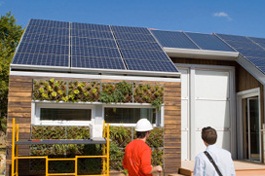Study espouses "green collar" jobs
 If there’s one thing that’s hitting home for millions of Americans, it’s the tough economic times of the current economic recession. With a housing market collapse, floundering stock market, bank bailouts, the largest oil spill disaster on record, and unemployment on the rise the situation in the United States is tense. Scientists, analysts, and even psychic gypsies have been deployed to find a solution to our stammering economy. As it turns out, renewable energy and “green collar” jobs may be the best solution to all of these problems, and usher in a new era of sustainable living.
If there’s one thing that’s hitting home for millions of Americans, it’s the tough economic times of the current economic recession. With a housing market collapse, floundering stock market, bank bailouts, the largest oil spill disaster on record, and unemployment on the rise the situation in the United States is tense. Scientists, analysts, and even psychic gypsies have been deployed to find a solution to our stammering economy. As it turns out, renewable energy and “green collar” jobs may be the best solution to all of these problems, and usher in a new era of sustainable living.
In late 2009, the American Solar Energy Society (ASES) released a report that suggests an aggressive deployment of renewable, or green, energy systems could be the key to unlocking our economic success in the future. The report, entitled “Estimating the Jobs Impact of Tackling Climate Change,” claims that by implementing green technological solutions, the U.S. will stand to net approximately 4.5 million jobs by 2030 with solar production, installation, and maintenance as the leader in launching a realistic start to the green economy.
The career fields that will stand to benefit most are the ones that have been hit the hardest during the recession such as carpenters, electricians, plumbers, mechanists, and sheet metal workers. The construction industry directly benefits from almost all of the growing renewable energy and energy efficiency sectors as well as from improvements in overall economic growth due to energy savings, and farming directly benefits from biomass and biofuel technology growth. Industries showing the largest job gains include construction, farming, professional services, public sector, retail, truck transportation, fabricated metals, and electrical equipment.
Another great benefit to jumping on the green-collar-workforce bandwagon isn’t just to get America back to work, but also to start making a more conscious effort to reduce our overall environmental impact. By adopting sustainable/renewable practices, we are ensuring that the Earth will be a lush and diverse ecosystem for future generations. “The twin challenges of climate change and economic stagnation can be solved by the same action—broad, aggressive, sustained deployment of renewable energy and energy efficiency,” said Brad Collins, ASES’ Executive Director, “the solution for one is the solution for the other.”



